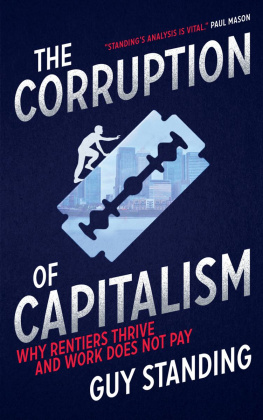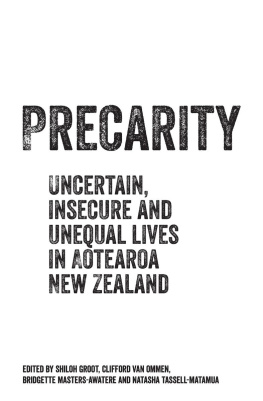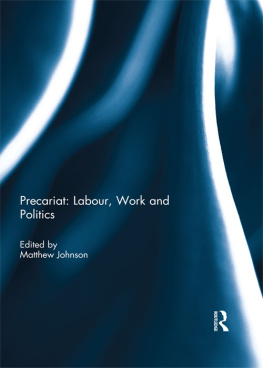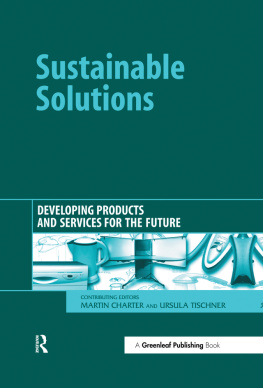Standing - A precariat charter: from denizens to citizens
Here you can read online Standing - A precariat charter: from denizens to citizens full text of the book (entire story) in english for free. Download pdf and epub, get meaning, cover and reviews about this ebook. City: London, year: 2014, publisher: Bloomsbury Academic;Bloomsbury Publishing, genre: Politics. Description of the work, (preface) as well as reviews are available. Best literature library LitArk.com created for fans of good reading and offers a wide selection of genres:
Romance novel
Science fiction
Adventure
Detective
Science
History
Home and family
Prose
Art
Politics
Computer
Non-fiction
Religion
Business
Children
Humor
Choose a favorite category and find really read worthwhile books. Enjoy immersion in the world of imagination, feel the emotions of the characters or learn something new for yourself, make an fascinating discovery.
A precariat charter: from denizens to citizens: summary, description and annotation
We offer to read an annotation, description, summary or preface (depends on what the author of the book "A precariat charter: from denizens to citizens" wrote himself). If you haven't found the necessary information about the book — write in the comments, we will try to find it.
Standing: author's other books
Who wrote A precariat charter: from denizens to citizens? Find out the surname, the name of the author of the book and a list of all author's works by series.
A precariat charter: from denizens to citizens — read online for free the complete book (whole text) full work
Below is the text of the book, divided by pages. System saving the place of the last page read, allows you to conveniently read the book "A precariat charter: from denizens to citizens" online for free, without having to search again every time where you left off. Put a bookmark, and you can go to the page where you finished reading at any time.
Font size:
Interval:
Bookmark:
FROM REVIEWS OF THE PRECARIAT
A very important book.
NOAM CHOMSKY, Massachusetts Institute of Technology, USA
Standing has produced a well-informed and important book investigating, for the first time in a comprehensive way, the direction in which global economic security is moving in the 21st century. The book is packed with statistics presented in a very readable form and drawing on extensive published research. It is a compelling account of economic insecurity
KEITH RANDLE, Work Organisation, Labour and Globalisation
[T]here is much in The Precariat to recommend it to labor educators, labor studies scholars, and activists of all sortsa book that provides a clear and detailed understanding of how the situation of precarious employment affects the lives of the precariat individually, collectively, day to day, and over the longer term. This is the books greatest value. Standing does this with many international examples, even though his main intellectual base is in Britain. His analysis of the impact of precarity, along with the diversity of examples from around the world, makes this the primary book on the topic to date.
JOE BERRY, Labor Studies Journal
[T]he analysis and arguments are compelling, for The Precariat brings together and develops many current strands of thought within the (social science) literature, and builds on the materialist tradition which ultimately leads to a rejection of neoliberalism. Standing captures some of the collectivist social policy tradition established by Richard Titmuss, but with more attention to all forms of work and notions of occupational citizenshipThe social policy community needs to engage more with issues at stake here, making The Precariat essential reading.
CHRIS DEEMING, Journal of Social Policy
This is undoubtedly a significant book, highlighting the plight of an increasing number of people in the global economy. Importantly, it does away with the myth that precarious labour is mainly to be found in the Global South, in less developed countries. In reality, it is increasingly a common form of employment also in industrialised countries as what was once considered to be atypical labour becomes more and more the normThis is a must-read book for both labour academics and activists.
ANDREAS BIELER, Capital & Class
This book should be read by everyone working in the humanities and the social sciencesThis is an outstanding book [which] should transform how we think about justice, injustice, class, work and leisure.
TARA BRABAZON, Charles Sturt University, Australia
Guy Standing provides an incisive account of how precariousness is becoming the new normality in globalised labour markets, and offers important guidelines for all concerned to build a more just society.
RICHARD HYMAN, London School of Economics, UK
This important and original book brings out the political dangers, so clear in contemporary America, of failing to address the insecurities of the Precariat. It also suggests the way forward: a reconstruction of the concept of work.
EILEEN APPLEBAUM, Center for Economic and Policy Research, Washington, DC, USA
Over 90% of workers in India are informal, poorly paid, without any economic security. Guy Standing combines vision with practicality in outlining policies that are urgently needed to provide security to workers such as these around the world.
RENANA JHABVALA, Self-Employed Womens Association of India
Buy Guy Standings book, The Precariat! Or nick/borrow it!
JOHN HARRIS,

There is an oft-repeated aphorism that has come to us from Heraclitus, 2,500 years ago: You never step into the same river twice. This is how it felt in presenting The Precariat, the predecessor of this book, in numerous places around the world. Although the same book was being presented each time, the presentations evolved, as some aspects faded and some came into sharper focus. Often this was due to the reactions of the audiences and well-informed questions.
To write a book is an act of vanity. To think audiences would be interested in listening to its arguments is equally so. Therefore, it is a pleasure to use this preface to thank all those who have listened and responded, orally, in letters and, most of all, in emails. It has been an educational experience, often tempered by sadness or anger when hearing of peoples personal stories of being in the precariat.
They are primarily responsible for the current book. It is the culmination of a long journey that began in the 1980s with papers and a series of national monographs on the growth of labour market flexibility, in the UK, Sweden, Finland, the Netherlands, Spain, Germany, Italy and Austria, some written with or academia. The underlying thesis was that the neo-liberal model would generate more economic insecurity and fragmented societies.
Much of the 1990s was spent gathering data from factory and worker surveys on labour flexibility and insecurity. These yielded factory! It is in seeing and listening to people in labour and work that one learns.
This book does not reproduce many statistics. That is not its purpose. It is intended to prompt others to focus on policies and institutional changes to reach out to the precariat. Political debate everywhere is in a state of disarray, with social democrats close to meltdown. They just do not appeal with their old messages. Worse, they do not seem to understand why.
Indeed, the energy needed to write this book stemmed from anger that mainstream policymakers and the media were so bereft of empathy with the precariat and the growing number of denizens in their midst. What has been happening is unnecessary and amoral. Anybody with a chance to speak should be shouting about the inequity and inequality that governments are fostering and oppositions are barely opposing.
In short, this book is an attempt to formulate an agenda for the precariat that could be the basis of a political movement, based not on a utilitarian appeal to a majority but on a vision of what constitutes a Good Society. It is also to some extent an attempt to respond to reactions to The Precariat.
One issue has preoccupied old-style Marxists. Is the precariat a class? An attempt is made in the book to respond to their assertions that it is not. However, there should be space for constructive debate. Precariousness (or precarity, as some prefer) is more than a social condition. A social condition cannot act. Only a social group with common or compatible aims can do that. One way of expressing the claim underlying both books is that the precariat is a class-in-the-making that must become enough of a class-for-itself in order to seek ways of abolishing itself. This makes it transformative, unlike other existing classes, which want to reproduce themselves in a stronger way.
Another point that deserves emphasis is the distinction between work and labour. Numerous commentaries on The Precariat failed to come to grips with this point. So, the essential differences are reiterated here.
The opening chapters define the key concepts, before discussing the implications for the precariat of the economic crisis and why a Precariat Charter is needed to provide an alternative to utilitarian democracy. The second half of the book presents 29 Articles that might constitute a Charter. They are not comprehensive, and readers will have their own priorities they may wish to add. But it is hoped that the set presented here could provide a framework for action.
Font size:
Interval:
Bookmark:
Similar books «A precariat charter: from denizens to citizens»
Look at similar books to A precariat charter: from denizens to citizens. We have selected literature similar in name and meaning in the hope of providing readers with more options to find new, interesting, not yet read works.
Discussion, reviews of the book A precariat charter: from denizens to citizens and just readers' own opinions. Leave your comments, write what you think about the work, its meaning or the main characters. Specify what exactly you liked and what you didn't like, and why you think so.













